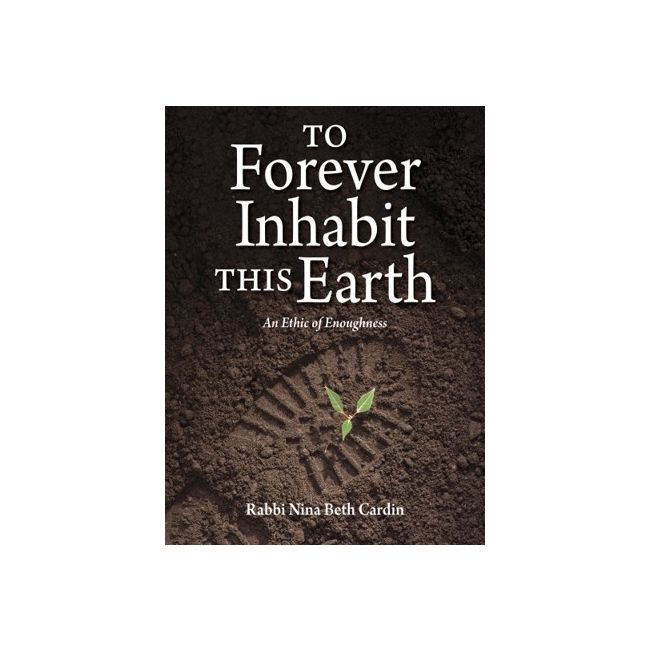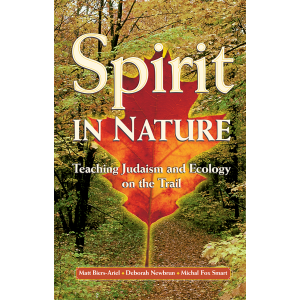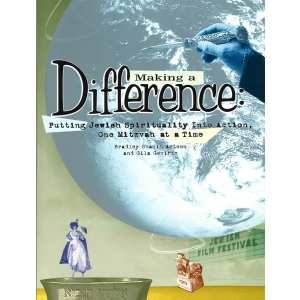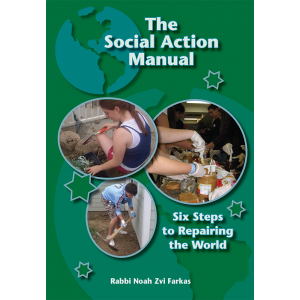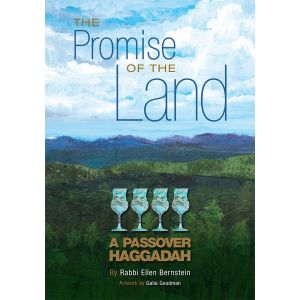To Forever Inhabit this Earth
"Wise and empathetic, this inspires."—Publishers Weekly
"Rigorous, yet lyrical, lofty yet practical, To Forever Inhabit This Earth belongs on the bookshelves of those who cherish Jewish texts and the environment around us." —Jewish Book Council
The great work of today’s generations is nothing short of saving the earth. We know enough, are capable enough. The question is: do we care enough? Will we work hard enough? Do we even recognize when we have enough?
Now noted environmentalist Rabbi Nina Beth Cardin challenges us to develop the individual and collective will needed to create change and offers spiritual and practical guidance to invigorate that effort.
To Forever Inhabit This Earth is a powerful must-read for anybody interested in the intersection of environmentalism and spirituality.
Cardin implores us to envision the world, not as a commodity but as a fragile, improbable, extraordinary gift whose well-being and future now depend on us, and using meticulously researched Jewish texts and the teachings of other faith traditions, she makes the case that environmental sustainability is a fundamental religious principle—and something we can address, if we have the will to do so.
"Despite the harms we as humanity have caused, if we dare to act boldly (which we can), based on the best guidance of our advisors (which we have), and recruit willing hearts (which we possess), we can heal the wounds, remedy our mistakes, and remake a safe and vibrant world for ourselves and all the generations to come. It is up to us."
Cardin asks us to consider spiritual questions, technical questions, and ethical questions about how we live in the world, and provides both spiritual and practical guidance on ways to rethink that, including:
- A contemplation of our spiritual connection to ‘the land’ and the call upon humanity to establish, preserve, and maintain a habitable world here on earth
- The biblical framework that urges us to see that life is awe inspiring and order is its essential ingredient, providing the stable environment that brings forth and sustains life
- A close look at texts from Genesis to consider two ways humans inhabit our world
- A daily meditation for preserving a habitable world
- Eight guidelines for ethical consumption
- A chart for a one-week self-assessment of our buying, consumption, and discarding practices
"An essential contribution to the work of forging the ethics we need to face the global environmental crisis."
—Karenna Gore, executive director of the Center for Earth Ethics at Union Theological Seminary
"Her Bible-based argument for taking care of the natural world is powerful and convincing."
—Reverend Sally Bingham, founder and president of Regeneration Project
"Guidance for how to grapple with our greatest environmental challenges."
—Dr. Jeremy Benstein, author of The Way into Judaism and the Environment
"Whether you are more familiar with Mary Oliver, Wendell Berry, and Aldo Leopold, or Ben Zoma, Nachman of Bratslav, and Rav Kook, you will be surprised, challenged, and inspired by this passionate call to engage in the sacred task of repairing and maintaining a habitable world."
—Dr. Mirelle B. Goldsmith, co-founder of Jewish Earth Alliance
"This book is a treasure . . . Rabbi Nina Beth Cardin's depth of knowledge, and her capacity to pull from a vast catalog of sources—nimbly quoting a sixteenth-century sage on one page and the creator of Calvin and Hobbes on another—brings forth a rich tableau, layered in story and midrash and little know esoterica . . . This belongs on a shelf with the classic tomes--alongside Rachel Carson's and others."
—Barbara Mahany, author of The Book of Nature: The Astonishing Beauty of God's First Sacred Text.
"At this time of climate destruction, when it can feel overwhelming to even know where to begin, To Forever Inhabit This Earth offers deep Jewish grounding for how to face the climate crisis, firmly rooted in our values."
—Rabbi Jeni Rosenn, founder and CEO of Dayenu: A Jewish Call to Climate Action
"Rabbi Cardin has gifted us with a deeply beautiful, accessible, and relatable framing for understanding and enacting Judaism as guidance toward earthly stewardship as both an inherited responsibility, and a path to Divine meaning in our time."
—Rabbi Andrue Kahn, editor of The Sacred Earth: Jewish Perspectives on Our Planet
"Jewish traditions can help readers reimagine their relationship with the Earth amid the threat of climate change, according to this innovative treatise from Rabbi Cardin (Tears of Sorrow, Seed of Hope). Drawing from such biblical stories as the creation narrative of Genesis 2, in which God instructs Adam and Eve to tend to the garden of Eden (an "eco-driven," nature-centered narrative that reverses the "ego-driven" story of Genesis 1, which presents nature as a wild resource to be "used and subdued"), she outlines an ethic of sustainability wherein humans "tend to the world's potential, serving the needs of all." Later chapters explore how to "renew, preserve, and reuse earth's resources" via personal and political efforts, with suggestions for blending environmental and spiritual practices with traditions like the Tu BiShevat seder, a festive meal held on the new year of trees that's been revived in recent years to reflect environmental concerns. Cardin expertly uses ancient Jewish ethics to add moral depth and clarity to pressing discussions of climate collapse and proffers a communal model of aid that reflects the interconnection of humans with nature and one another. Wise and empathetic, this inspires."
—Publishers Weekly
"For over two decades Rabbi Nina Beth Cardin has been a major leader in the Jewish Environmental movement. Her new book, To Forever Inhabit This Earth, is a capstone on her visionary focus on the seeing the issues of climate change and sustainability through a uniquely Jewish lens.
In a time when the current Federal Administration seeks to roll back recent laws and regulations to protect the earth and anathematize the words “climate” and “climate change”, to publish now harks back to an earlier time when the movement was top of mind and action. But looked at another way, this book resonates with those out of current power who know what is desperately needed for the long game of changing our behavior and protecting the planet.
This book weaves together both the larger issues to focus on and the practical ways we can make changes in our own lives in a particularly nuanced way.
The book is divided into seven chapters, perhaps to mirror the seven days of creation. The introductory chapter sets forth the need to protect and sustain the planet. Cardin’s ambition is to deepen Aldo Leopold’s groundbreaking concept of a “land ethic,” through a Jewish perspective, to articulate a Jewish land ethic.
In the second chapter, Rabbi Cardin eloquently develops the concept of Yishuv Ha’olam, preserving a habitable world, which she views as a mitzvah, indeed as one of the 613 commandments we are enjoined to do as Jews. Of the concept of Yishuv Ha’olam she writes, “there is never a time it cannot be pursued. It is implicated in all our acts and decisions for almost everything we do affects the natural world and thus life all around us.”
She follows with a brilliant reading of the first two chapters of Genesis, with Genesis 1 embodying the principle of Survivability and Genesis 2 inculcating an ethic of Sustainability. This is a model of how to read biblical text in a contemporary way and feels natural and unforced.
Chapter four is the most poetic of the book, “Holy Sparks.” Rabbi Cardin celebrates the holiness of the natural world in moving prose with both rabbinic and modern responses brought to our attention.
If Yishuv Ha ‘olam is the most important positive commandment, bal taschit, do not destroy, is the essential negative commandment for the environmental movement. Building on past commentary from Maimonides, through Sampson Raphael Hirsch to contemporary thinkers, she shows how this seemingly simple phrase can be enacted. Rabbi Cardin even creates a chart for us to show how on a practical level we can follow this simple commandment on a weekly basis in our daily lives.
For an ethic of enoughness, it is no surprise that biblical laws of shmittah are adapted in the penultimate chapter to challenge a culture of consumption.
In her last chapter — seven, just as God finds his creation good on the seventh day, Rabbi Cardin celebrates the planet we have and the gratitude we should feel for it. Rigorous, yet lyrical, lofty yet practical, To Forever Inhabit This Earth belongs on the bookshelves of those who cherish Jewish texts and the environment around us." —Jewish Book Council

